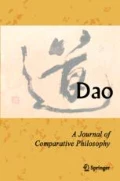Abstract
This essay critically revisits Jiwei Ci’s prudential argument for political democracy in China from the very Tocquevillian standpoint on which Ci’s core theoretical argument is predicated. I argue that Ci’s underlying assumption and argument regarding the enabling conditions of democracy actually depart significantly from Tocqueville’s own view due to Ci’s overly positive understanding of equality of conditions as directly constitutive of a democratic society and his assumed causal connection between capitalist society and political democracy. After clarifying what Tocqueville meant by equality of conditions and discussing his prudential remedy for the perils of democracy, I conclude by suggesting an alternative pragmatic and prudential justification for democracy in China that is more consistent with the Tocquevillian conception of democracy.
Similar content being viewed by others
References
Ackerly, Brooke A. 2005. “Is Liberalism the Only Way toward Democracy? Confucianism and Democracy.” Political Theory 33.4: 547–576.
Angle, Stephen C. 2012. Contemporary Confucian Political Philosophy. Cambridge: Polity.
Arendt, Hannah. 1958. The Human Condition. Chicago: The University of Chicago Press.
Barber, Benjamin R. 1984. Strong Democracy: Participatory Politics for a New Age. Berkeley: University of California Press.
Bellah, Robert N., et al. 1985. Habits of the Heart: Individualism and Commitment in American Life. Berkeley: Univeristy of California Press.
Cahoone, Lawrence E. 2002. Civil Society: The Conservative Meaning of Liberal Politics. Oxford: Blackwell.
Chan, N. Serina. 2011. The Thought of Mou Zongsan. Leiden: Brill.
Ching, Julia. 1997. Mysticism and Kingship in China: The Heart of Chinese Wisdom. Cambridge: Cambridge University Press.
Ci, Jiwei. 1994. Dialectic of the Chinese Revolution: From Utopianism to Hedonism. Stanford: Stanford University Press.
______. 2014. Moral China in the Age of Reform. New York: Cambridge University Press.
______. 2019. Democracy in China: The Coming Crisis. Cambridge, MA: Harvard University Press.
de Bary, Wm. Theodore. 1998. Asian Values and Human Rights: A Confucian Communitarian Perspective. Cambridge, MA: Harvard University Press.
Dewey, John. 1954. The Public and Its Problems. Athens, OH: Swallow Press.
______. 1981. “Democracy Is Radical.” In John Dewey: The Later Works, vol. 2, edited by Ann Boydston. Carbondale: Southern Illinois University Press.
Dickson, Bruce J. 2003. Red Capitalists in China: The Party, Private Entrepreneurs and Prospects for Political Change. Cambridge: Cambridge University Press.
Elstein, David. 2012. “Mou Zongsan’s New Confucian Democracy.” Contemporary Political Theory 11.2: 192–210.
Eno, Robert. 1990. The Confucian Creation of Heaven: Philosophy and the Defense of Ritual Mastery. Albany: State University of New York Press.
Fingarette, Herbert. 1972. Confucius: The Secular as Sacred. New York: Harper.
Foucault, Michel. 1991. “Governmentality.” In The Foucault Effect: Studies in Governmentality, edited by Graham Burchell, Colin Gordon, and Peter Miller. Chicago: University of Chicago Press.
Franco, Paul. 2014. “Tocqueville and Nietzsche on the Problem of Human Greatness in Democracy.” Review of Politics 76.3: 439–467.
Frőhlich, Thomas. 2017. Tang Junyi: Confucian Philosophy and the Challenge of Modernity. Leiden: Brill.
He, Baogang, and Mark E. Warren. 2011. “Authoritarian Deliberation: The Deliberative Turn in Chinese Political Development.” Perspectives on Politics 9.2: 269–289.
Howard, Marc M. 2003. The Weakness of Civil Society in Post-Communist Europe. Cambridge: Cambridge University Press.
Inglehart, Ronald, and Christian Welzel. 2005. Modernization, Cultural Change, and Democracy: The Human Development Sequence. New York: Cambridge University Press.
Kalberg, Stephen. 1997. “Tocqueville and Weber on the Sociological Origins of Citizenship: The Political Culture of American Democracy.” Citizenship Studies 1.2.: 199–222.
Kean, John. 1998. Civil Society: Old Images, New Visions. Stanford: Stanford University Press.
Kim, Sungmoon. 2014. Confucian Democracy in East Asia: Theory and Practice. New York: Cambridge University Press.
______. 2016. Public Reason Confucianism: Democratic Perfectionism and Constitutionalism in East Asia. New York: Cambridge University Press.
______. 2018. Democracy after Virtue: Toward Pragmatic Confucian Democracy. New York: Oxford University Press.
Lee, Janghee. 2004. Xunzi and Early Chinese Naturalism. Albany: State University of New York Press.
Linz, Juan J., and Alfred Stepan. 1996. Problems of Democratic Transition and Consolidation: Southern Europe, South America, and Post-Communist Europe. Baltimore: Johns Hopkins University Press.
Lipset, Seymour M. 1960. The Political Man: The Social Bases of Politics. New York: Anchor Books.
Machle, Edward J. 1993. Nature and Heaven in the Xunzi: A Study of the Tian Lun. Albany: State University of New York Press.
Manent, Pierre. 1996. Tocqueville and the Nature of Democracy. Trans. by John Waggoner. Lanham: Rowman and Littlefield.
Mansfield, Harvey. 2010. Tocqueville: A Very Short Introduction. Oxford: Oxford University Press.
Putnam, Robert D. 2000. Bowling Alone: The Collapse and Revival of American Community. New York: A Touchstone Book.
Rosenblum, Nancy L. 1998. Membership and Morals: The Personal Uses of Pluralism in America. Princeton: Princeton University Press.
Schwartz, Benjamin I. 1985. The World of Thought in Ancient China. Cambridge, MA: Belknap.
Tocqueville, Alexis de. 2000. Democracy in America. Trans. by Harvey C. Mansfield and Delba Winthrop. Chicago: The University of Chicago Press.
Tseng, Roy. 2020. “Political Meritocracy versus Ethical Democracy: The Confucian Political Ideal Revisited.” Philosophy and Social Criticism 46.9.: 1033–1052.
Tu, Weiming. 1979. Humanity and Self-Cultivation. Berkeley: Asian Humanities Press.
Villa, Dana. 2005. “Hegel, Tocqueville, and Individualism.” Review of Politics 67.4.: 659–686.
______. 2008. Public Freedom. Princeton: Princeton University Press.
Walder, Andrew G. 1988. Communist Neo-Traditionalism: Work and Authority in Chinese Industry. Berkeley: University of California Press.
Welch, Cheryl B. 2013. “Deliberating Democratization with Tocqueville: The Case of East Asia.” In Tocqueville and the Frontiers of Democracy, edited by Ewa Atanassow and Richard Boyd. New York: Cambridge University Press.
Author information
Authors and Affiliations
Corresponding author
Additional information
Publisher’s Note
Springer Nature remains neutral with regard to jurisdictional claims in published maps and institutional affiliations.
Rights and permissions
About this article
Cite this article
Kim, S. Tocqueville between America and China and Democracy. Dao 21, 431–449 (2022). https://doi.org/10.1007/s11712-022-09841-z
Accepted:
Published:
Issue Date:
DOI: https://doi.org/10.1007/s11712-022-09841-z



